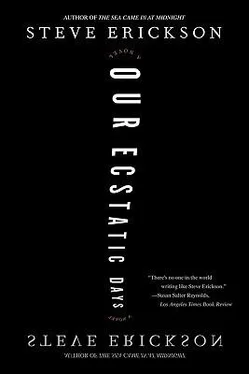Steve Erickson - Our Ecstatic Days
Здесь есть возможность читать онлайн «Steve Erickson - Our Ecstatic Days» весь текст электронной книги совершенно бесплатно (целиком полную версию без сокращений). В некоторых случаях можно слушать аудио, скачать через торрент в формате fb2 и присутствует краткое содержание. Год выпуска: 2006, Издательство: Simon & Schuster, Жанр: Фантастика и фэнтези, на английском языке. Описание произведения, (предисловие) а так же отзывы посетителей доступны на портале библиотеки ЛибКат.
- Название:Our Ecstatic Days
- Автор:
- Издательство:Simon & Schuster
- Жанр:
- Год:2006
- ISBN:нет данных
- Рейтинг книги:5 / 5. Голосов: 1
-
Избранное:Добавить в избранное
- Отзывы:
-
Ваша оценка:
- 100
- 1
- 2
- 3
- 4
- 5
Our Ecstatic Days: краткое содержание, описание и аннотация
Предлагаем к чтению аннотацию, описание, краткое содержание или предисловие (зависит от того, что написал сам автор книги «Our Ecstatic Days»). Если вы не нашли необходимую информацию о книге — напишите в комментариях, мы постараемся отыскать её.
takes place on the forbidden landscape of a defiant heart.
Our Ecstatic Days — читать онлайн бесплатно полную книгу (весь текст) целиком
Ниже представлен текст книги, разбитый по страницам. Система сохранения места последней прочитанной страницы, позволяет с удобством читать онлайн бесплатно книгу «Our Ecstatic Days», без необходимости каждый раз заново искать на чём Вы остановились. Поставьте закладку, и сможете в любой момент перейти на страницу, на которой закончили чтение.
Интервал:
Закладка:
She’s dreamed it so often, sometimes she’s almost not certain it really happened. She breaks the lake’s surface gasping, grabs the side of the gondola, and her soul implodes at the horror of its emptiness; for a minute she stares into the bottom of the gondola like he must be there and she just isn’t seeing him. Like there’s some place he could be hiding. But it’s as if he was never there at all. She dives beneath the water again, thrashing around as if to catch him on his way to the bottom — but there’s no one to catch, and she rises to grab the gondola once more and look frantically around her. It’s only then she hears something, and looks up.
~ ~ ~
Looks up and sees him inthe distance, high in the sky. Hears his voice as it gets farther away
Mama where are you?
like he would call from his crib
Mama come back
and the owl that has him in its clutches actually seems to falter a bit, confused by the burden and sound, finding Kirk bigger and noisier than the usual prey. Sometimes in her dream Kirk plummets to earth, and she wakes to a black room with the taste of no please on her lips.
One morning about six months ago she got up from the toilet to stare down at the blood in the bowl. She was so fascinated by the pattern that she sat on the bathroom floor studying it, circling to see it from every angle. Next month the same pattern and the month after that, and it’s been the same every month since. She keeps trying to decipher this menstrual rorschach; slit between her legs is the stigmata of the full moon from which her womb telegraphs a message. A month or so back she even tried copying it down on paper before it dissolved into streaks down the white porcelain. Sometimes she lies in bed at night and sees the pattern in the dark above her, and watches baffled for hours until its mystery lulls her back to sleep.
Lately, in a city where sooner or later any kind of cult behavior becomes a fashion statement, everyone wears the blue of the lake, all the colored parasols of five years ago having given way to blue from the neck down. Everyone camouflages herself and slips alongside the water like a spy of the shoreline, disguised as a splash. Blue hat, blue shirt, coat blue except for dark shadows rippling across the buttons like riptides, or flashes of white on the thigh of the pants like the glare of the sun on the water’s surface. When she rows her silver gondola on the lake wearing a brilliant red dress, the lake around her suddenly clears of all other boats, taking cover, as if she’s an incoming fireball from space. As if she’s a drop of blood — but is she the lake bleeding, or blood rained from the sky? She can see it in everyone’s eyes, the red provocation of her, the defiant affront of her red to the blue of the lake, daring it to rise higher and seep deeper into the land.
If the lake sends back my boy, I’ll wear whatever it wants, the blue garb of its Order, I’ll wear blue until the day I die. If it wants I’ll wear nothing and dip my naked body into its blue embrace whenever it wants me, lie nude in my silver gondola and drift wherever it drifts me. If the lake will just send me back my boy.
~ ~ ~
Until then, the only thing blueabout her is her name….
… the writer who lived down the hall of the Hamblin having left her with Lulu Blu….
… and afterward she couldn’t tell for certain when she stopped being Kristin; maybe it was that very moment she came up for air and saw the empty gondola. But now she’s taken refuge in Lulu. She’s fled from any Kristin who would leave her three-yearold son out in the middle of a lake because she had this insane idea she had to stop the lake from taking him. She fled to Lulu because she believed Kristin should have sunk back down to the bottom where she belonged, and left to someone with better wings the task of flying after that owl. So it was a kind of debased suicide, abandoning Kristin for Lulu, and now she sits on her porch at the water’s edge in her red dress staring out over the lake while blue citizens drift by in their blue boats and whisper among themselves The Madwoman in Red, whose son was abducted by owls.
When a woman becomes a mother, she develops this new instinct for danger. She develops this instinct for every possible disaster that awaits her child around every corner. Lulu, once called Kristin, doesn’t know if five years ago her danger-instinct failed or overwhelmed all reason so that she led her son to danger instead of from it, so that everything she did to protect him only endangered him. Little amorphous lumps of human clay, that’s what she once thought babies were; but then she found there were things about her child that had nothing to do with her, things that were his own from the beginning, from the minute he was born, perhaps from before he was born, perhaps from before he was conceived, although there was no point getting into that since no one knows anyway. Anyway, she realized, that’s when you’re stuck with the Soul. That’s when your child becomes inescapable evidence of the cosmos, a membrane-map of the spirit, that’s when God becomes a Piercing Hope or Dark Suspicion or both. Because there’s nothing a mother fears more than the chaos of the world.
And then danger has won.
~ ~ ~
Then danger has won. Thenfear takes a form. Detaches itself from all the things she was afraid of, the reasonable things and the stupid, and becomes its own thing, bigger than either the reasonable things or the stupid things. Grows in the pregnant heart until it’s born; and then she stops being a person, then she becomes fear’s walking womb.
Then her fear is bigger than her motherhood. Fear has metamorphosed into the danger it feared
and it’s called a lake.
Absently she listens to the radio all the time now, the radio she listened to all the time with her son when the lake came because the music was the one thing the lake, alive with its own music, couldn’t or wouldn’t drown. She sits on the porch of her house while the people sail by looking at her, and she listens for a song she and Kirk sang together
all the little babies go, Oh! oh! I want to!
while sometimes the snakes of music swarming the lake coil through her house. They wind along wooden beams, pythons of melancholy English verse from before she was born, and Debussy melodies but only if Debussy had been a bossa nova guitarist in a heroin haze, brooding aquatic chamber quartets rising in the background like autumn glimpsed for the first time on the horizon of midsummer. Boas — gorgeous and dangerous — of static bursts and swoons of strings drape themselves along her window sill and slither through her house like women’s voices, dusky, jazz-depraved, desperate.
The first time the lake sends her a vision, Lulu is sitting on her porch at dusk and feels a swell in the lake beneath her. It slowly rises from the water before her, a huge bubble. She gets up from the chair and walks to the edge of the porch and, as she watches, the bubble bursts to reveal a man in his forties with black hair and black beard and startling electric blue eyes, a man whose name she never knew. She lived with him when she first came to L. A. as a teenager nine years before, a kind of sexual serf servicing him when, after being abandoned by his pregnant Asian-American wife, he wasn’t crashing around in a secret room at the bottom of his house where he worked day and drunken night on a huge blue calendar that completely reordered history according to the chronology and logic of apocalypse. Even now she looks back on that time dispassionately, having grown up with a practical view of her own sensuality and surviving then by whatever means she could — until one night he disappeared. She wasn’t altogether certain he was even the father until Kirk was born, another candidate having been a doltish Japanese boy who jumped her one afternoon in the rain out in the Black Clock time-capsule cemetery on the west side of town, now under water, before out of the blue a lightning bolt literally left him lying next to her on the grass, life only in his erection. In the early months of her pregnancy, and particularly on the night she believed she miscarried her twins only for them to somehow become manifest again in an inexplicable resurrection, she felt Kirk and Bronte glow inside her as if with electricity — so when Kirk was born, she wouldn’t have been shocked if he had been half Asian. Now as Kirk’s father rises from the lake in Lulu’s vision, it’s only long enough for him to reach out to her, not as if asking her to save him but as if beseeching her to understand or even forgive him; and at that moment, for the first time in the eight years since she last saw him, although she’s often suspected it, she knows he’s dead.
Читать дальшеИнтервал:
Закладка:
Похожие книги на «Our Ecstatic Days»
Представляем Вашему вниманию похожие книги на «Our Ecstatic Days» списком для выбора. Мы отобрали схожую по названию и смыслу литературу в надежде предоставить читателям больше вариантов отыскать новые, интересные, ещё непрочитанные произведения.
Обсуждение, отзывы о книге «Our Ecstatic Days» и просто собственные мнения читателей. Оставьте ваши комментарии, напишите, что Вы думаете о произведении, его смысле или главных героях. Укажите что конкретно понравилось, а что нет, и почему Вы так считаете.











